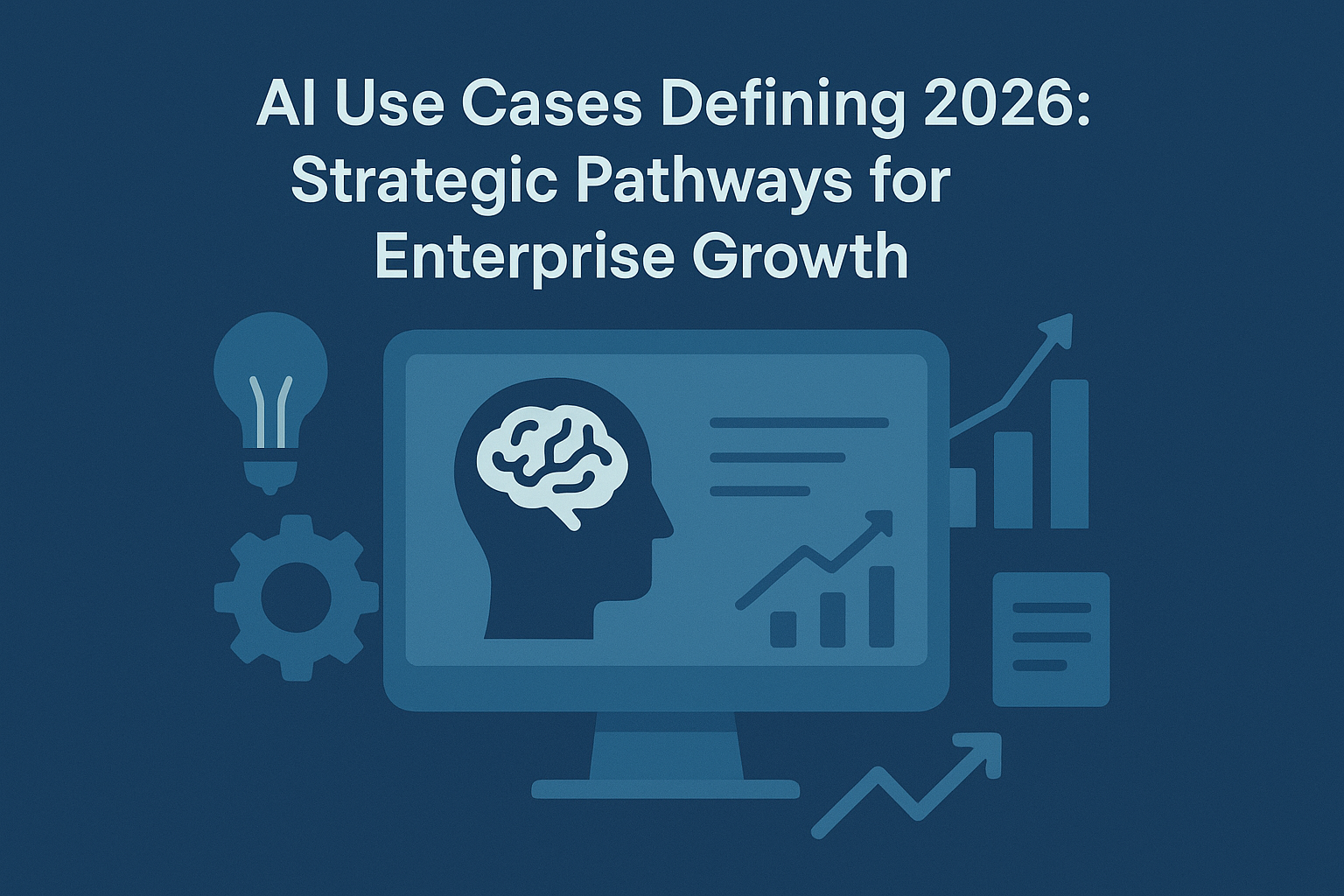Introduction
The trajectory of artificial intelligence has shifted from experimental adoption to becoming a vital driver of enterprise growth. By 2026, AI won't be just a futuristic goal; it will be a core element of business strategy for organizations striving to excel in highly competitive markets.
With the spread of AI agents for business, industries are adopting next-generation intelligence that not only automates tasks but also orchestrates decision-making, predictive modeling, and real-time action. This transformative change isn't just about technology—it’s about rethinking how companies compete, serve customers, and generate value. The landscape is rapidly adopting AI solutions for real-time operational decisions, enabling organizations to transition from reactive problem-solving to proactive performance improvements.
For C-level leaders, the focus has shifted from “what AI can do” to “which AI use cases will shape the future, and how can businesses leverage them for tangible returns?” The following sections examine the leading AI use cases expected to drive enterprise success in 2026, highlighting their business impact, operational significance, and strategic importance across various industries.
The Strategic Role of AI in 2026
AI use in 2026 transcends automation and predictive analytics. It is evolving into a deeply integrated intelligence fabric that guides enterprise operations, customer engagement, and innovation pipelines. Organizations no longer view AI as a support function; it is an enterprise core, driving transformation at scale.
Executives are focusing on embedding AI into mission-critical processes, empowering AI agents to enable businesses to operate autonomously, handle complex data ecosystems, and respond with precision in dynamic environments. These agents are expected not only to improve efficiency but also to redefine decision quality across departments, from finance and compliance to product innovation and supply chain orchestration.
Real-time AI solutions are emerging as a critical differentiator for enterprises that compete in industries where milliseconds define outcomes—finance, healthcare, and logistics being prime examples. Integrating AI solutions for real-time operational frameworks enables enterprises to achieve unparalleled levels of speed, accuracy, and personalization.
Dominant AI Use Cases in 2026
AI in Finance and Banking
Financial institutions are projected to lead AI adoption in 2026 as they face increasing regulatory complexity, fraud risks, and heightened customer expectations. AI use in this sector extends beyond chatbots and predictive analytics, encompassing areas such as autonomous fraud detection, algorithmic trading, and compliance automation.
AI agents for business are being trained to monitor financial transactions at scale, identify anomalies with precision, and execute corrective actions instantly. These capabilities allow banks to minimize fraud-related losses while adhering to evolving compliance standards across global jurisdictions. Moreover, AI for enterprise-grade portfolio management will drive hyper-personalized investment strategies, analyzing millions of market signals in real time to maximize returns for clients.
Institutions are also integrating AI solutions for real-time operational risk assessment, enabling proactive identification of liquidity risks, cybersecurity threats, and credit defaults. By 2026, the banking landscape will rely heavily on autonomous decision frameworks that combine AI’s computational depth with human oversight to deliver measurable business value.
AI in Healthcare and Life Sciences
Healthcare is another domain where AI use cases are set to dominate in 2026, particularly as enterprises invest in precision medicine, clinical automation, and real-time patient care. AI is moving beyond diagnosis support to becoming an active decision-making partner for physicians, care providers, and life sciences researchers.
AI agents for business in this sector are optimizing hospital operations by predicting patient inflows, managing resource allocation, and automating administrative workflows. These agents also assist in clinical trials by accelerating molecule discovery, improving patient recruitment, and analyzing trial data with unmatched accuracy.
AI solutions for real-time operational support are being used in intensive care units and emergency response scenarios, where data-driven insights can mean the difference between life and death. Additionally, AI for enterprise-level healthcare networks is facilitating interoperability between hospitals, insurance providers, and regulatory authorities—ensuring compliance while driving better care outcomes.
AI in Retail and Omnichannel Commerce
Retail enterprises are leveraging AI to deliver hyper-personalized customer experiences, optimize supply chains, and drive revenue growth through intelligent insights. By 2026, AI use cases in retail are expected to redefine how brands connect with consumers in both digital and physical environments.
AI agents for business are orchestrating everything from dynamic pricing models to demand forecasting, enabling retailers to respond to market shifts instantly. These agents analyze real-time purchase behavior, inventory levels, and logistics data to recommend pricing and promotional strategies that maximize margins while enhancing customer satisfaction.
The integration of AI solutions for real-time operational decision-making enables retailers to predict consumer preferences with high accuracy, ensuring the right products are available at the right place and at the right time. AI for enterprise retail ecosystems will also drive advancements in automated merchandising, conversational commerce, and immersive shopping experiences powered by AR/VR integrations.
AI in Manufacturing and Supply Chain Optimization
In manufacturing, AI is no longer a productivity booster—it is the foundation of smart factories and intelligent supply networks. By 2026, AI use cases in this sector are projected to significantly reduce downtime, cut waste, and accelerate innovation cycles.
AI agents for business are managing predictive maintenance schedules, identifying anomalies before they lead to equipment failure, and ensuring minimal production interruptions. These agents also facilitate adaptive manufacturing, where production lines adjust in real time to accommodate demand fluctuations or raw material shortages.
Enterprises are adopting AI solutions to gain real-time operational visibility across their supply chains, integrating IoT sensors, digital twins, and advanced analytics platforms. This creates an AI-driven enterprise ecosystem where procurement, logistics, and inventory management are seamlessly aligned, reducing costs while enhancing service delivery.
AI in Energy and Utilities
Energy enterprises are increasingly integrating AI to enhance grid resilience, manage renewable energy sources, and optimize asset utilization. By 2026, AI use cases will include real-time load balancing, predictive maintenance of power infrastructure, and optimization of carbon footprints for sustainability compliance.
AI agents for business are expected to play a pivotal role in forecasting energy demand, integrating renewable sources effectively, and responding to disruptions with precision and accuracy. Moreover, AI for enterprise-driven energy analytics will allow utility providers to monitor operational efficiency, reduce losses, and ensure regulatory compliance.
AI solutions for real-time operational grid monitoring and anomaly detection will further strengthen energy resilience, ensuring uninterrupted power delivery while minimizing operational costs.
AI Investment Outlook for 2026
As AI use matures, enterprises are shifting from proof-of-concept initiatives to enterprise-wide deployment strategies. By 2026, global AI spending is projected to exceed $500 billion, with a significant portion allocated to AI agents for business and AI solutions that enable real-time operational decision-making.
C-level executives are prioritizing investments in platforms that offer not just automation but also intelligent orchestration, enabling AI to deliver measurable business outcomes within enterprise ecosystems. This includes ROI-focused AI deployments in finance, healthcare, retail, manufacturing, and energy—sectors that are projected to lead global AI adoption over the next decade.
Conclusion
AI use in 2026 will be defined by its ability to deliver operational precision, customer-centric experiences, and revenue acceleration across industries. AI agents for business and AI solutions for real-time operational frameworks will anchor this evolution, shaping the next era of enterprise competitiveness. For C-level leaders, the imperative is clear: invest strategically, integrate intelligently, and scale AI initiatives to ensure sustainable growth in a market that rewards innovation and speed.
Business Operations




























































 Copy Link
Copy Link



























